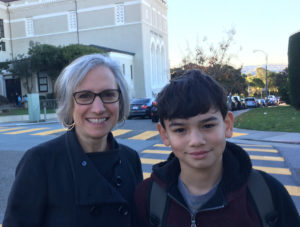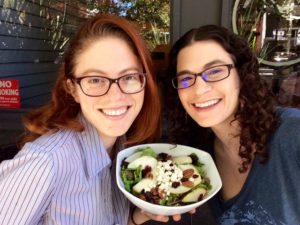Make Those Green New Year’s Resolutions Last
POSTED ON January 3rd, 2018 BY Nancy RobertsHere at Gigantic we often advocate to make public commitments or pledges a part of an environmental behavior change campaign. New Year’s resolutions are a great example of behavior change efforts (even though 80% of them are discarded by February!) The most effective resolutions are made publicly, have specific goals, and are realistic and simple. Going public means you are more likely to keep your resolutions, so, with that in mind, here are some of the Gigantic team’s 2018 resolutions:

Lisa will be trying a new approach to reducing the large amounts of food waste related to raising her 11-year old son, Jackson. On most days of the current school year, he returned home with an entire lunch uneaten. Applying barriers and benefits research, she talked to Jackson about why it was happening. Barriers included forgetting—he was playing with friends instead of eating—and not finding the food appetizing after it sat in his lunchbox for 3 hours. “Like all moms I worry if my child is eating enough. But the waste is troubling me. In 2018 I’m going to let Jackson choose to purchase the school lunch if he is hungry. We gave him a watch with an alarm to remind him to eat. And to address my worry, I’ll send along a non-perishable snack in case of emergency.” A pilot test run demonstrated that Jackson chose the school lunch every day, so the new year is already looking food-waste free!

Kas is back in the saddle this year – bike saddle that is. She starts training in January for the AIDS/LifeCycle; she will ride her bike from San Francisco to Los Angeles during the first week of June. Kas often spots litter and illegal dumping on her Bay Area training rides. Sometimes cyclists themselves are the cause of litter with items that fall out of their overstuffed jersey pockets or, worst of all, those cyclists who purposely discard wrappers along the way. Kas pledges to pick up what trash she can and/or report illegal dumping through the See Click Fix app on her phone… and if by chance she can catch up to someone who has littered, she will take a moment to “educate” them on the finer points of leaving nature better than when they found it.

Stef continues her efforts to create a backyard wildlife refuge, in spite of some setbacks in 2017, including relentless weeds and an infestation by some very hungry, non-native caterpillars that killed all 18 bush lupines. “After countless hours of weeding and hand cramps from spraying infested plants with soapy water, the promise of a quick fix with pesticides looked pretty darn tempting,” she admits. But fearing the pain of cognitive dissonance if she were to use chemicals in her all-eco yard, Stef pledged to apply more elbow grease instead. She’ll put down her third layer of sheet-mulching and is set to crowd out weeds with low-water, bee-feeding, bird-harboring California natives early this spring.

Nancy is keeping the same resolution that she has (more or less!) successfully kept for the last 3 years. She resolves to pick up and properly discard at least 1 piece of plastic trash on every dog walk. Moxie the Pugwiler likes her exercise, so Nancy takes her out around 500 times a year – that’s over 500 pieces of plastic removed from San Francisco’s Sunnyside neighborhood annually. Unfortunately, there is no problem with finding the trash. “I often try to pick up the trash in a place where others see me doing it,” says Nancy, “It’s my attempt to norm litter pickups, to help people see the problem as everyone’s problem and a solution that we all can own.”

Nicole feels inspired by her work on the StopFoodWaste.org campaign to try to waste less by using a shopping list based on the meals she plans to eat each week. Though it’s hard to plan ahead with a busy and spontaneous schedule, it will help her save food and money, and not feel so guilty when feeding that slimy kale to her backyard worms, though it’s better than the landfill. “Food waste is a big problem in America, but there are a lot of helpful tips and tools to plan, store and use up extra food and leftovers,” says Nicole, “It also helps to eat before going shopping!”
We wish everyone a Happy New Year and pledge to work with you for a cleaner, greener 2018. Please let us know if we can help with your environmental behavior change campaigns.